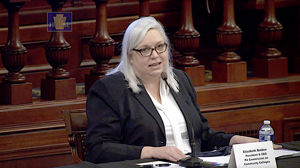Pennsylvania legislators support community college commission, citing workforce development needs

(The Center Square) – Workforce development, particularly at a time when Pennsylvania’s employment numbers are in flux amid the pandemic, was a recurring theme at a recent budget hearing between a House panel and representatives of the state’s community college system.
The House Appropriations Committee on March 1 held its hearing for the Pennsylvania Commission for Community Colleges, the nonprofit, volunteer membership association representing the state’s 14 community colleges.
For all of the challenges of this past year, community colleges have the resources to help Pennsylvania navigate a post-pandemic landscape, said Elizabeth Bolden, president and CEO of the commission.
“Our students cannot wait,” Bolden said. “They need help – now – and community colleges, thanks to (legislators’) support, can act now. We are ready now.”
Lawmakers on the Appropriations Committee largely were supportive of the community college system and funneling state dollars into it in the year ahead.
“We’re very blessed in Pennsylvania,” said state Rep. Stan Saylor, R-Red Lion, who chairs the Appropriations Committee. “You really have been meeting the needs of Pennsylvania’s economy with job creation. You’re saving the taxpayers of Pennsylvania a lot of money.”
State Rep. Patty Kim, D-Dauphin, said she was supportive of community colleges’ ask for a 5 percent year-over-year budget increase, amounting to about $12 million.
“I believe workforce development is key to help this state move forward, post-pandemic,” Kim said.
State Rep. Clint Owlett, R-Wellsboro, asked college officials at the hearing about collaboration with local employers and received assurances such efforts have continued amid the pandemic.
“We’re trying to stay very close to the employers,” said John Sygielski, president of Harrisburg Area Community College.
Within his college, Sygielski said a number of apprenticeship programs have generated strong interest between students and employers. Examples, he said, include an EMT program.
“It’s really encouraging to see that engagement,” Owlett said. “These are great paying jobs. That’s a win-win for everybody.”
While the community colleges’ industry collaborations have been strong in some sectors, state Rep. Torren Ecker, R-Mount Holly Springs, said he desires a stronger bridge between training and education in one industry: agriculture.
“I think you’re doing great things for the manufacturing community,” Ecker said. “I’d like to see you do the same for the agriculture community as well.”
While much of the recent hearing was supportive, the siloed nature of the state’s community college system was another issue that arose on several occasions.
Unlike many other states in the country, Bolden said Pennsylvania’s community colleges have an autonomous structure that has long been encouraged as officials from different institutions vie for students and financial resources.
“Honestly, it’s complex,” Bolden said. “We have a system in Pennsylvania that is not built on collaboration and partnerships; it’s built on competition. We have a very decentralized higher education system.”
Tuesday Stanley, president of Westmoreland County Community College, said she believes legislation ultimately would be needed to create a more uniform system across the state.
“There’s only so much that can be done on an institution-by-institution basis,” Stanley said.
Disclaimer: This content is distributed by The Center Square

